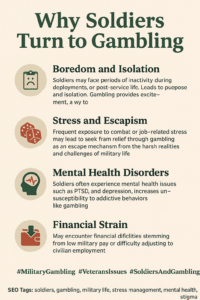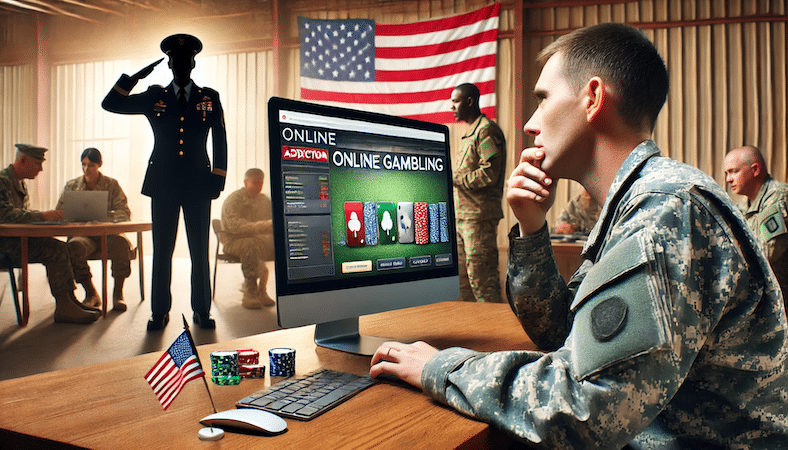Gambling addiction in the military doesn’t usually grab headlines, but it’s a much bigger deal than most people realize. If you picture a soldier, you probably see someone disciplined and strong, but soldiers are just as human as anyone else. Sometimes, they are even more at risk for specific challenges, like gambling problems. This article takes a closer look at what gambling addiction really means for our soldiers, how to spot it, and the steps that can genuinely make a difference for those who serve.
The Scope of Gambling Addiction in the Military
Gambling addiction, also called gambling disorder, can affect anyone. However, in the military, unique pressures and circumstances complicate the problem. Research from organizations like the National Council on Problem Gambling shows that rates of gambling addiction among active duty military members and veterans can be two to three times higher than the rates seen in the general population. On many military bases, gambling is directly available—slot machines and betting make it easy for those already at risk to get caught up in unhealthy habits.
The culture in the military strongly values resilience and self-reliance. That can actually make it harder for soldiers to ask for help or admit to having a gambling problem. The pressure to keep up appearances often pushes the issue underground, making the real numbers more challenging to track down and shine a light on.
During long deployments, soldiers sometimes turn to gambling as a way to deal with boredom, anxiety, homesickness, or isolation. The military environment, combined with easy access to betting facilities like base slot machines or online gambling among friends, creates a situation where addiction can form quickly and take hold before anyone notices.
What Makes Soldiers More Vulnerable?
The military lifestyle brings some severe stress. Frequent moves, long separations from family, traumatic experiences, and the pressure to perform all add up over time. Gambling offers a fast escape—a distraction that feels thrilling or numbing, depending on what someone’s seeking. It can look like a harmless break from reality or something to pass the time, but it gets out of hand for many.
- Unpredictable Schedules: Irregular hours and gaps during deployments mean lots of downtime, which can easily be filled with gambling if options are available.
- Isolation: Being separated from loved ones, primarily when stationed far away, can lead to feeling disconnected. That sense of isolation sometimes leads to risky behaviors like gambling for comfort or excitement.
- Access to Gambling: Slot machines and card rooms are a reality on specific US military bases, especially those overseas. The temptation is right in reach where troops live and work, removing many roadblocks against starting a habit.
- Mental Health Conditions: Conditions such as PTSD, depression, and anxiety are not rare among service members. People wrestling with these challenges might turn to gambling as a way to cope or feel something different, whether that means excitement or simply distraction.
Several studies make it clear that young, single male service members with a history of trauma are most at risk for developing a gambling problem. Still, anyone wearing the uniform, regardless of age or background, can face this struggle. The pressures, loneliness, and circumstances apply to many, and gambling addiction doesn’t discriminate.
Signs of Gambling Addiction in Soldiers
Gambling addiction isn’t always about lost cash; sometimes, it’s the subtle changes in attitude and daily habits. Here are warning signs that soldiers or their loved ones might notice:
- Struggling to control how much time or money is spent betting, despite promising to cut back
- Withdrawing from friends, family, or social activities to spend more time gambling
- Mood swings, irritability, or anxiety when not gambling, sometimes tied to losing or chasing losses
- Hiding debt, unexplained borrowing, or being secretive about finances
- Neglecting duties, missing work, or failing to meet responsibilities on base
- Using gambling to escape from worries, stress, or emotional pain
These warning signs aren’t always easy to spot, and the military stigma surrounding weakness makes them even easier to hide. Soldiers are often skilled at presenting a tough front, which means unhealthy gambling habits might only surface after serious financial trouble or even disciplinary action has already happened.
How the Military Addresses Gambling Addiction
The Department of Defense has started to take problem gambling seriously, but the systems in place for support are still catching up. Resources for gambling addiction remain less built out compared to those for alcohol or substance abuse, even though the consequences can be devastating for soldiers and their families.
- Education and Policy: Some branches now include gambling wellness in annual training. However, not every unit gets the same information, and rules about gambling differ widely depending on the branch and location. That patchwork approach can be confusing or lead to gaps in what’s implemented on the ground.
- Screening and Prevention: More recently, some mental health screenings ask about gambling habits and problems. While this marks progress, awareness among service members and leadership is still growing, and not everyone has regular check-ins.
- Support Resources: Counseling and chaplain services are available on some bases for confidential talks about gambling struggles. Trust is the real challenge; many soldiers worry that seeking help could threaten their careers or relationships with superiors.
Beyond the official support, some non-profit and veterans’ groups have helplines and gatherings for those linked to military service. Groups like the National Council on Problem Gambling and Gamblers Anonymous have confidential hotlines tailored to this community, offering private help outside the chain of command.
Common Roadblocks Soldiers Face
Even with increased awareness and support available, soldiers often run into unique challenges on their path to recovery:
- Fear of Stigma: Worries about being labeled weak or untrustworthy stop many from speaking up, even when they need help.
- Career Impact: There’s a strong concern that seeking help will result in lost security clearances or problems with superiors, making it risky to be honest about struggles.
- Lack of Awareness: Many soldiers—and even leaders—just aren’t aware of how common or harmful gambling addiction can be until it causes serious issues.
- Limited Treatment Access: Resources differ from base to base and between branches, and those stationed overseas often have even fewer support options.
I’ve listened to veterans share how early help could have prevented years of financial grief. However, those same barriers kept them silent until the situation escalated. That’s why empathy and encouragement from commanding officers and peers matter so much; just a small show of understanding convinces some soldiers that they aren’t alone or broken.
Ways to Prevent and Manage Gambling Problems
Breaking free from gambling addiction is tough, but not impossible. The sooner a soldier or their support network acts, the better the chance of a positive outcome. Here are effective strategies, both on active duty and in civilian life:
- Start Honest Conversations: Leaders and peers willing to talk openly about mental health and gambling issues help create an environment where asking for support is a sign of strength, not shame—even sharing that these common problems can go a long way in shattering isolation.
- Peer Support: Involving veterans who have experienced addiction firsthand gives others hope and proof that recovery is possible. Sometimes hearing “I’ve dealt with it too” is far more powerful than anything from a manual.
- Education Programs: Consistent training for all service members on spotting signs of different addictions—including gambling—makes it easier for everyone to be aware. The more relatable and scenario-based the training, the better the results.
- Safe Access to Help: Anonymous hotlines, online counseling, and flexible therapy hours matter for anyone who doesn’t want their struggles to become public knowledge within the unit.
- Leadership Buy-In: Officers who put their support into action—like personally checking in or allowing time off for recovery—help create a healthy culture for everyone.
Treatments such as cognitive behavioral therapy (CBT) have shown positive results for soldiers dealing with gambling addiction, especially when combined with group therapy or self-help programs. On top of that, financial education and counseling on budgeting are crucial for helping service members recover from losses and regain control over their lives.
Extra Context: Gambling Addiction and Veterans
The challenge doesn’t always end once a soldier returns to civilian life. For many, gambling problems can pop back up or get worse after they separate from the military. The sudden switch from rigid structure to total freedom—and stressors like unemployment or untreated trauma—can make veterans particularly vulnerable.
Veterans’ Affairs (VA) hospitals and clinics have progressed by adding more addiction care to their programs. Yet despite improvements, gaps persist, especially for veterans in remote communities or for those who feel too proud or isolated to reach out. This is why support groups, online forums, and veterans’ centers are so important. They unite former soldiers, reducing stigma and acting as lifelines for those ready to move forward.
It’s also important to remember that spouses and family members of soldiers and veterans can be deeply affected by gambling addiction within their households. Financial stress, secrecy, and emotional distance often make recovery even more complex. Encouraging family involvement in counseling or group therapy can be a game-changer, helping the individual and their loved ones heal together.
Frequently Asked Questions
Here are straightforward answers to some questions commonly asked by soldiers and their families about gambling addiction:
How do I know if my gambling is a problem?
If gambling leaves you stressed, anxious, in debt, or struggling to stop despite your best efforts, it might be time to get some help. Awareness and honest reflection are key; don’t wait until the situation becomes unmanageable.
Will seeking help hurt my military career?
Commanders and counselors are getting better at treating addiction as a health concern instead of a rule-breaking issue. Help is confidential, and reaching out early often protects your career by keeping things from snowballing into bigger problems.
Are there safe ways to enjoy gambling?
Some people set personal limits or keep things social, but if you’ve ever felt you might be at risk, it’s safest to avoid gambling altogether. Soldiers facing extra stress or past trauma are better off choosing healthier outlets for downtime and challenges.
Final Thoughts
Gambling addiction in soldiers is a real challenge, but not a hopeless one. Open dialogue, improved resources, and real buy-in from leaders help make recovery possible. With more focus on early detection, treatment access, and zero-judgment support, anyone serving in uniform can overcome this hurdle. Soldiers already give so much in their service. Ensuring they can reach out for help, without risking their future, is just another way to show we have their backs.
Video: Is GAMBLING a Silent Epidemic Among Military Veterans Struggling with PTSD?

